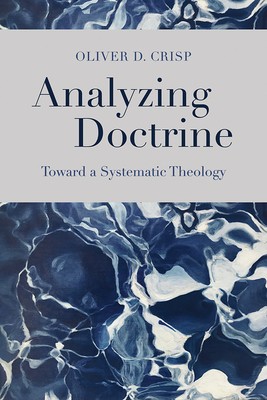
- We will send in 10–14 business days.
- Author: Oliver D Crisp
- Publisher: Baylor University Press
- ISBN-10: 1481309862
- ISBN-13: 9781481309868
- Format: 21.1 x 23.6 x 2.8 cm, kieti viršeliai
- Language: English
- SAVE -10% with code: EXTRA
Reviews
Description
In Analyzing Doctrine Oliver Crisp carefully considers the relationship of systematic theology to analytic philosophy, arguing that the tools of analytic philosophy can be fruitfully applied to traditional systematic theology. Doing so, as Analyzing Doctrine reveals, creates a distinct and rich analytic theology.
Analyzing Doctrine employs traditional themes of systematic theology to structure Crisp's analytic theological analysis. Crisp examines the doctrine of God, the mystery of the Trinity, and God's intention in creating and relating to the world. He then addresses the incarnation, original sin, the virgin birth, Christ's two wills, salvation, and, finally, the resurrection. In the process of making his constructive case, Crisp engages a range of historic theological voices from the tradition, as well as contemporary biblical studies and systematic theology. Clear, accessible, and engaging, Analyzing Doctrine establishes analytic theology's place in the architecture of systematic theology while also challenging some of its misconceptions. By seamlessly weaving together Christian tradition and analytic philosophy to construct his theology, Crisp argues for the integral role that analytic theology plays in the theological imagination.EXTRA 10 % discount with code: EXTRA
The promotion ends in 23d.02:15:39
The discount code is valid when purchasing from 10 €. Discounts do not stack.
- Author: Oliver D Crisp
- Publisher: Baylor University Press
- ISBN-10: 1481309862
- ISBN-13: 9781481309868
- Format: 21.1 x 23.6 x 2.8 cm, kieti viršeliai
- Language: English English
In Analyzing Doctrine Oliver Crisp carefully considers the relationship of systematic theology to analytic philosophy, arguing that the tools of analytic philosophy can be fruitfully applied to traditional systematic theology. Doing so, as Analyzing Doctrine reveals, creates a distinct and rich analytic theology.
Analyzing Doctrine employs traditional themes of systematic theology to structure Crisp's analytic theological analysis. Crisp examines the doctrine of God, the mystery of the Trinity, and God's intention in creating and relating to the world. He then addresses the incarnation, original sin, the virgin birth, Christ's two wills, salvation, and, finally, the resurrection. In the process of making his constructive case, Crisp engages a range of historic theological voices from the tradition, as well as contemporary biblical studies and systematic theology. Clear, accessible, and engaging, Analyzing Doctrine establishes analytic theology's place in the architecture of systematic theology while also challenging some of its misconceptions. By seamlessly weaving together Christian tradition and analytic philosophy to construct his theology, Crisp argues for the integral role that analytic theology plays in the theological imagination.

Reviews